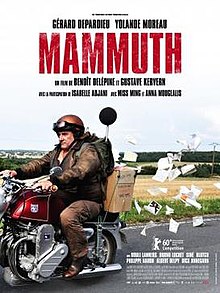
Jules and Jim is a 1962 French New Wave romantic drama film directed, produced and co-written by François Truffaut. Set before, during, and after World War I, it follows a tragic love triangle involving French bohemian Jim, his shy Austrian friend Jules, and Jules' girlfriend and later wife Catherine.
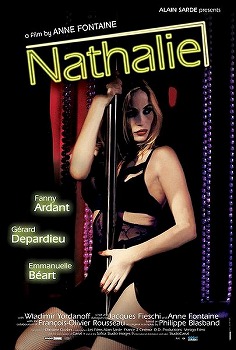
Nathalie... is a 2003 French drama film directed by Anne Fontaine, and starring Fanny Ardant, Emmanuelle Béart, and Gérard Depardieu. The screenplay concerns a woman who discovers that her husband is cheating on her.

The Last Metro is a 1980 historical drama film, written and directed by François Truffaut, that stars Catherine Deneuve and Gérard Depardieu.

Benoît Delépine is a French comedian and film director. He is known for his satirical activities on TV channel Canal+.

Germinal is a 1993 French epic film based on the 1885 novel by Émile Zola. It was directed by Claude Berri, and stars Gérard Depardieu, Miou-Miou and Renaud. At the time it was the most expensive movie ever produced in France. It was the fourth most attended film of the year in France.

Locked Out is a 2006 French film directed by and starring Albert Dupontel, and written by him in collaboration with Guillaume Laurant.

Séraphine is a 2008 French-Belgian film directed by Martin Provost and written by Marc Abdelnour and Provost. It stars Yolande Moreau as the French painter Séraphine Louis and Ulrich Tukur as Wilhelm Uhde. It won the 2009 César Award for Best Film.

Münch was a German motorcycle manufacturer which, during the 1960s, produced the Mammut, a four-cylinder motorcycle using an NSU car engine.

Gustave Kervern, also known as Gustave de Kervern and Gustave K/Vern, is a French actor, director and screenwriter. He is best known for his collaboration with Benoît Delépine.

The Pack is a 2010 horror film directed, written and co-produced by Franck Richard. It stars Yolande Moreau, Philippe Nahon, Émilie Dequenne and Benjamin Biolay. The film is about Charlotte and Max who come across a restaurant. After Max disappears, Charlotte returns later to find him and gets herself trapped in a cage by the restaurant owner, who has a pack of cannibals with her. The film premiered at the Cannes Film Festival on 15 May 2010 and was first shown in North America at the Fantasia Festival. The film has received generally mixed reviews.

Potiche is a 2010 comedy film written and directed by François Ozon, based on the play of the same name by Pierre Barillet and Jean-Pierre Gredy. It stars Catherine Deneuve, Gérard Depardieu, Fabrice Luchini, Karin Viard, Judith Godrèche and Jérémie Renier. Set in 1977, the film tells the story of a submissive wife who gets to run her husband's umbrella factory, after the employees rebel against their tyrannical manager. In French, a potiche is a decorative vase, but by extension means "window dressing" or, roughly, "trophy wife". The film competed at the 67th Venice International Film Festival and received two Magritte Award nominations, winning Best Supporting Actor for Jérémie Renier.
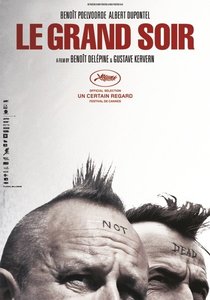
Le Grand Soir is a 2012 French-Belgian comedy-drama film directed by Benoît Delépine and Gustave de Kervern. The film competed in the Un Certain Regard section at the 2012 Cannes Film Festival where it won the Special Jury Prize. It won the Magritte Award for Best Costume Design.

Camille Rewinds is a 2012 French drama film directed by Noémie Lvovsky. The film was screened in the Directors' Fortnight section at the 2012 Cannes Film Festival where it won the Prix SACD. Yolande Moreau received a Magritte Award for Best Supporting Actress for her role.
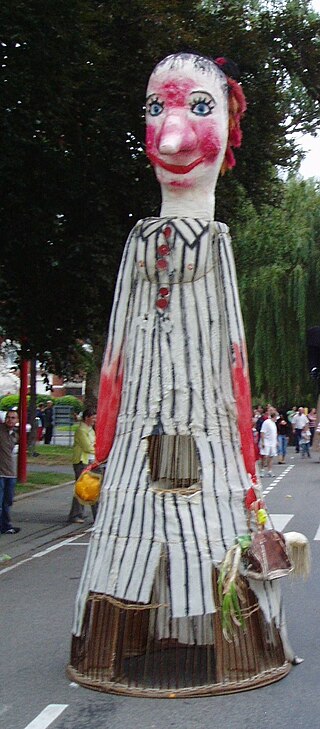
When the Sea Rises is a 2004 French-Belgian romantic comedy film directed by Yolande Moreau and Gilles Porte. It was Moreau's directorial debut.

Louise Hires a Contract Killer is a 2008 French comedy film written and directed by Gustave de Kervern and Benoît Delépine. The film won the Prix Jacques Prévert du Scénario for Best Original Screenplay in 2009.

Journey Through China is a 2015 French drama film directed by Zoltan Mayer, his first feature film that was said to be "thoughtful and well-lensed".
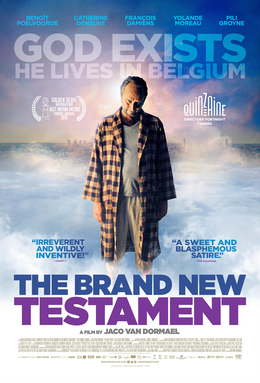
The Brand New Testament is a 2015 fantasy dark comedy film written, produced, and directed by Jaco Van Dormael. It is a co-production among Belgium, France, and Luxembourg. The film was screened at the Directors' Fortnight section at the 2015 Cannes Film Festival. It was selected as the Belgian entry for the Best Foreign Language Film at the 88th Academy Awards, making the December shortlist of nine films, but was not nominated. The Brand New Testament received ten nominations at the 6th Magritte Awards, winning four awards, including Best Film and Best Director for Van Dormael. The film has become a cult film.

Saint-Amour is a 2016 French-Belgian comedy-drama film written, produced and directed by Benoît Delépine and Gustave Kervern.

I Feel Good is a 2018 French comedy satire of both capitalism and communism directed by Benoît Delépine and Gustave de Kervern.
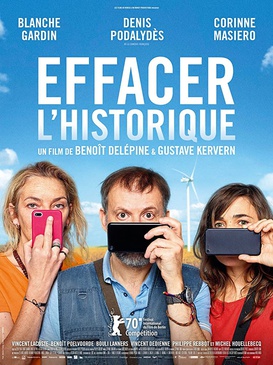
Delete History is a 2020 French-Belgian comedy film co-produced, written and directed by Benoît Delépine and Gustave Kervern. It was selected to compete for the Golden Bear in the main competition section at the 70th Berlin International Film Festival. At Berlin, the film won the Silver Bear 70th Berlinale prize. The film is also scheduled to show at the 2020 Angoulême Francophone Film Festival.
